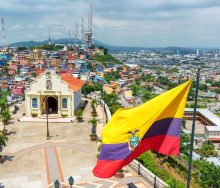‘Debt-for-nature’ contracts are emerging around the world, often involving poorer countries to help them mitigate the impact of climate change and help those countries foot the bill.
Ecuador has now made the largest ever debt-for-nature swap, converting US$1,6 billion (R30,4bn) of the country’s international bonds for a US$656 million (R12,5bn) loan that will be used for the conservation of the Galapagos Islands.
Last month, with the help of the Pew Bertarelli Ocean Legacy Project and other partners, the country converted the debt through a bond issued by global investment bank Credit Suisse.
According to euronews, the loan will be repaid over the next 18 years and will allow the country to provide about US$17m (R322,8m) to conservation each year.
Ecuador plans to start handing out the conservation funds from September to combat climate change and overfishing, which have put pressure on the Galapagos ecosystem.
Monitoring, control and patrolling to safeguard key marine ecosystems in the archipelago will be prioritised to benefit migrating species in the area, such as whale and hammerhead sharks and turtles.
The Galapagos are home to many unique endemic animal species including giant tortoises, marine iguanas, other reptiles and a great variety of birds.
The Galapagos is famously the place where Darwin formulated ideas leading to his realisation of evolution and natural selection.














